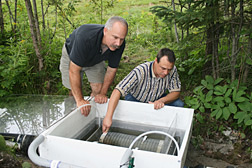This page has been archived and is being provided for reference purposes only. The page is no longer being updated, and therefore, links on the page may be invalid.
Read the magazine story to find out more. |
|
|
From Golf to Gulf, Drainage Industry Greens
By Don ComisJanuary 13, 2009
A new idea being explored for cleaning drainage water originating on and off golf courses is to attach a filter cartridge to drainage pipe and retention pond outlets to filter out pollutants before they reach streams.
That's one approach being tested in an Agricultural Research Service (ARS) project bringing three industries together with agribusiness to clean drainage water before it contributes to water quality problems downstream, such as the Gulf of Mexico's "dead zone." The project participants are the turf industry, the drainage industry, and the industrial products/byproducts industry.
Agricultural engineer Kevin King with the ARS Soil Drainage Research Unit in Columbus, Ohio, is testing the filter cartridges.
King uses commercial cartridges, filled with the typical water cleansers used in drinking water treatment plants and home aquariums, as well as industrial byproduct materials or materials often discarded as waste. He has conducted tests on golf courses and watersheds in Texas and Minnesota and is currently setting up a field test facility in Ohio. Preliminary results are promising.
King and his colleagues are also testing water treatment facility residues such as alum to improve the ability of fairway vegetative buffer areas to filter out pollutants before they reach drainage pipe outlets. Alum is a byproduct of the ammonia alum used for water purification.
Scientists at six ARS labs in five states are collaborating on the project. The labs are in Ohio, Indiana, Minnesota, Pennsylvania and Maryland.
The idea is to join forces for mutual benefit--using industrial byproducts from the wallboard industry, electric power plants, steel mills, water treatment plants and other industries to clean drainage water. These industries benefit by having an alternative to landfilling their byproducts. In turn, they benefit the drainage industry, farmers, and the turf industry by making sure discharge waters are clean for the next user and the environment. And in some cases they can save water by re-using the cleansed water.
Read more about this research in the January 2009 issue of Agricultural Research magazine.
ARS is a scientific agency of the U.S. Department of Agriculture.

